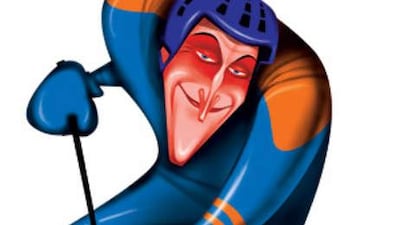Who do you think is sport's all-time best? Each week, we will profile a candidate, inviting you to decide who should top our list of 50. All participants will be entered into a draw for the weekly adidas prize and an end-of-contest Etihad Holidays four-day trip for two, including business class flights and accommodation, to a mystery location. We will reveal the full 50 at the end, but this week Rob McKenzie looks at ice hockey's Wayne Gretzky.
Wayne Gretzky was a David whom Goliaths rightly feared. He entered the National Hockey League when it was coming off a particularly brutish era and reformed it with his beautiful play. Indeed it worked both ways: the very league reshaped itself in tribute to him. Gretzky had begun his professional career in a rival circuit, when the World Hockey Association's Indianapolis Racers scooped him up at the age of 17, a year before the NHL could draft him. The cash-starved Racers then sold his contract to another WHA outfit, the Edmonton Oilers.
The NHL just had to have Gretzky. So it absorbed four WHA franchises, the Oilers among them. Of those four teams only one remains in its original location: Edmonton, untouchable for it was the fountain of Gretzky's glory. He was probably the greatest ice hockey player ever. Consider this: He scored 215 points in 1985-86; the most any other player had ever scored was 152. I saw Gretzky play at Winnipeg Arena. It was a horrible experience. Winnipeg might be leading the game, or more likely losing by only a little bit, but all of a sudden Gretzky would corral the puck near his own blue line, his No 99 jersey half-tucked, his eyes agleam, and he would head for open ice, and you knew - you knew - he was going to score.
He did not possess great speed. He did not possess great power. But he always knew where to go to confuse the other team. He would skate with his head down, yet opponents never seemed able to line him up and knock him on his butt (with the exception of Toronto's Bill McCreary during a nationally broadcast game in Jan 1981; the moment stands out that much). But under the standard operating procedure, Gretzky would slalom around big defencemen like they were traffic pylons, slap the puck past a mesmerised goaltender, lift his stick into the air and sheepishly accept the congratulations of his grateful teammates.
"Growing up," Gretzky once said, "I was always the small guy. When I was 5 and playing against 11-year-olds, who were bigger, stronger, faster, I just had to figure out a way to play with them. "When I was 14, I played against 20-year-olds, and when I was 17, I played with men." A neurologist said Gretzky had the fastest long loop reflexes of anyone ever tested at the University of British Columbia's laboratories. The long loop reflex is the time between the brain's signal and the body's movement, so this means Gretzky was able to send a pass or fire a shot far more quickly than his peers.
While they were pondering about where the play was, Gretzky had already decided where it was going. His present equalled their future. No wonder he scared them. He ended his career owning the league record for goals (894; the runner-up is at 801), assists (1,963, runner-up, 1,249) and points (2,857; runn- er-up, right behind at 1,887). Nine times he was the NHL's most valuable player and four times he won the Stanley Cup.
But to my mind Gretzky's greatest achievement came after he hung up his skates in 1999. If there had been a knock on Gretzky, the player, it was that he lacked toughness. He was more Boy Wonder than Caped Crusader and always needed a burly teammate to be his bodyguard. But in 2002, he proved his mettle and more as the man in charge of Canada's hockey team at the Salt Lake City Olympics. Canadians craved for the gold medal and fully expected Gretzky to bring it home after a 50-year absence.
But things started poorly: a humiliating 5-2 loss to the Swedes, an embarrassing 3-2 squeaker over the lowly Germans, a 3-3 come-from-behind draw with the Czechs. At that moment Gretzky galvanised team and nation. He alleged that the whole world (except the Canadian part) relished his country's downturns. "Everybody loves to see us lose," he fumed. "Nobody wants us to win but our players and our loyal fans."
He attacked reports of team disunity as "American propaganda". He took the pressure off the team and put it on himself. He would be the lightning rod - the protector, for once. It worked. Venting their hero's anger, Team Canada eliminated Finland 2-1 in the quarter-final; bounced Belarus (ancestral home of the Gretzky clan) 7-1 in the semis; then stuffed the Americans 5-2 in the gold medal match. Gretzky became a Goliath - but now, at age 47, he is David again.
He is in his fourth season as coach of the Phoenix Coyotes (formerly the Winnipeg Jets). The Coyotes are a sad lot. They have never been to the play-offs under him. He could have quit two years ago and nobody would have blamed him. And yet he goes on, as unspoilt by defeat as he has always been by conquest. This man should be on Canada's money. @Email:rmckenzie@thenational.ae
Cast your vote and enter a draw for a weekly Dh500 adidas voucher and a dream trip with Etihad Holidays. If you think Gretzky is the all-time best, text G34 to 2337 Texts cost Dh5 and voting will end at midnight on Thursday December 11.

